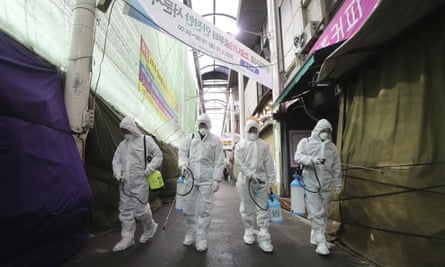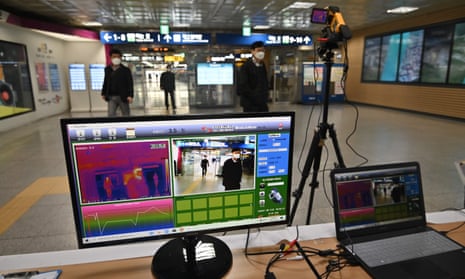Sunday morning found Kim Tae-woo sitting in his convenience store at the normally bustling East Daegu train station, counting the day’s customers on the fingers of one hand.
“Things are beyond quiet here,” he said. “It feels like I’m at a meditation centre. I’m thinking of removing the magazine stand. No one has the peace of mind to flip through them now.”
South Korea’s president, Moon Jae-in, placed the country on red alert on Sunday as its number of coronavirus infections tripled over the weekend to 602.
Barring the Diamond Princess cruise ship docked in Japan, South Korea now has the highest number of infections outside China.
Residents of Daegu, the country’s fourth-largest city and the centre of its outbreak, are leaving nothing to chance.
The city’s streets were eerily quiet, with stores and restaurants closed and stations, markets and shopping areas devoid of the usual foot traffic. The few people who dared to venture out were masked and wearing gloves.
More than half of all South Korean cases so far have been linked to the Daegu branch of the Shincheonji Church of Jesus sect, with over 100 more cases coming from a mental health ward at Daenam hopital in the nearby town of Cheongdo.
Officials believe cases at the hospital may be related to a funeral of the sect leader’s brother, held there at the beginning of February.
While the exact source of the infections remains unclear, health officials have pointed to a 61-year-old female member of the sect who tested positive on 18 February. Local authorities are now scrambling to trace all 9,336 members of the church’s Daegu branch as well as out of town visitors who may have come into contact with the woman.
A taxi driver, Kwang-ho Lee, wondered why the woman hadn’t done more to stop spreading the disease.
“It’s ruining everyone here,” he said. “I’m making less than 10% of my normal income. The other drivers and I are just standing around, waiting all day. Sometimes we’re even too scared to talk to each other because we don’t know who has the virus and who might belong to that cult.”

There is widespread anger over the sect’s secretiveness and their apparent unwillingness to cooperate with health officials. According to the authorities, more than 600 members of the Daegu branch are not answering calls or texts and cannot be accounted for.
A petition demanding that the government forcibly disband the Shincheonji Church of Jesus was posted on the presidential office’s website on Friday, and has so far attracted more than 300,000 signatures.
The public fury directed at both the sect and the authorities was echoed by a bus driver, whose vehicle carried a single passenger.
“If I violate a traffic law, police contact me before the day is over and I get fined,” he said. “How come they can’t get hold of so many cult members? How can we say South Korea is an IT powerhouse with this going on?”
At Dongseung-ro, a popular meeting place for the city’s youth, things were quiet and most of the stores and cafes were closed.
Sung-jin Choi and Yoon Na, a couple in their twenties, had decided to go out, masked up and with gloves on.
“We saw on the internet that now is the time to experience this area looking like Gotham City, so we decided to have a look,” said Choi.

Na said that some couples were choosing not to meet up because no one is sure whether their partner belonged to the cult. “Only couples who know each other very well can be sure,” he added.
One of the few places in Daegu where more than 20 people had congregated on Sunday was at the city’s medical centre.
The hospital has become a dedicated Covid-19 treatment centre, with paramedics and nurses working in full biohazard suits and plastic face visors.
Some 30 people were waiting to be examined in a makeshift tent set up outside the main hospital building. Despite the constant activity by staffers, things were curiously quiet, the silence broken only by the comings and goings of ambulances and the odd cough.
On the other side of the city, the Shincheonji Church of Jesus building was locked up and the area, as with other parts of Daegu, was deserted.
Simon Kim, a spokesman for the church, said it was cooperating fully with authorities.
Q&AHow can I protect myself and others from the coronavirus outbreak?
Show
The World Health Organization is recommending that people take simple precautions to reduce exposure to and transmission of the coronavirus, for which there is no specific cure or vaccine.
The UN agency advises people to:
- Frequently wash their hands with an alcohol-based hand rub or warm water and soap
- Cover their mouth and nose with a flexed elbow or tissue when sneezing or coughing
- Avoid close contact with anyone who has a fever or cough
- Seek early medical help if they have a fever, cough and difficulty breathing, and share their travel history with healthcare providers
- Advice about face masks varies. Wearing them while out and about may offer some protection against both spreading and catching the virus via coughs and sneezes, but it is not a cast-iron guarantee of protection
Many countries are now enforcing or recommending curfews or lockdowns. Check with your local authorities for up-to-date information about the situation in your area.
In the UK, NHS advice is that anyone with symptoms should stay at home for at least 7 days.
If you live with other people, they should stay at home for at least 14 days, to avoid spreading the infection outside the home.
“We’re the biggest victims of the Covid-19 epidemic,” he said, “[and we have] become a target of hatred”. He said a membership list the church had given the authorities had been leaked, provoking hate speech and members being pressured to leave their jobs.
Back at the train station, a group of five people sat around the communal TV set in the ticket hall. All turned out to be workers rather than travellers; given the lack of customers, there was little need for them to be behind their counters.
When one of them coughed, the others turned away from the screen to look at her.
“It’s not corona,” she said, with a wave of her hand. “My tea went down the wrong way.” No one looked relieved.
